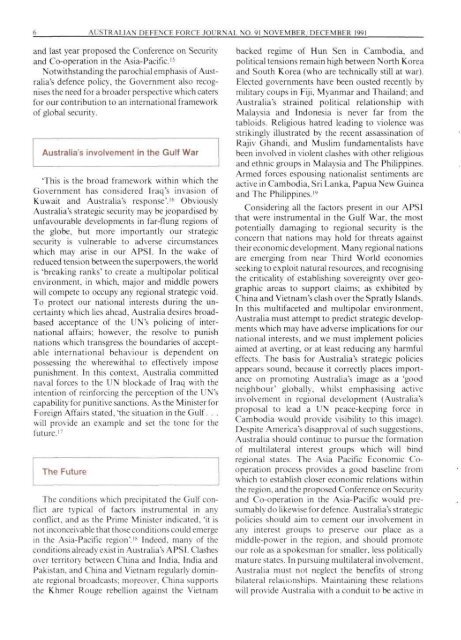ISSUE 91 : Nov/Dec - 1991 - Australian Defence Force Journal
ISSUE 91 : Nov/Dec - 1991 - Australian Defence Force Journal
ISSUE 91 : Nov/Dec - 1991 - Australian Defence Force Journal
Create successful ePaper yourself
Turn your PDF publications into a flip-book with our unique Google optimized e-Paper software.
6 AUSTRALIAN DEFENCE K)R( 1 IQIkVM NO. <strong>91</strong> NOVEMBER DECEMBER 19<strong>91</strong><br />
and last year proposed the Conference on Security<br />
and Co-operation in the Asia-Pacific. 15<br />
Notwithstanding the parochial emphasis of Australia's<br />
defence policy, the Government also recognises<br />
the need for a broader perspective which caters<br />
for our contribution to an international framework<br />
of global security.<br />
Australia's involvement in the Gulf War<br />
'This is the broad framework within which the<br />
Government has considered Iraq's invasion of<br />
Kuwait and Australia's response'. 16 Obviously<br />
Australia's strategic security may be jeopardised by<br />
unfavourable developments in far-flung regions of<br />
the globe, but more importantly our strategic<br />
security is vulnerable to adverse circumstances<br />
which may arise in our APSI. In the wake of<br />
reduced tension between the superpowers, the world<br />
is 'breaking ranks' to create a multipolar political<br />
environment, in which, major and middle powers<br />
will compete to occupy any regional strategic void.<br />
To protect our national interests during the uncertainty<br />
which lies ahead. Australia desires broadbased<br />
acceptance of the UN's policing of international<br />
affairs; however, the resolve to punish<br />
nations which transgress the boundaries of acceptable<br />
international behaviour is dependent on<br />
possessing the wherewithal to effectively impose<br />
punishment. In this context, Australia committed<br />
naval forces to the UN blockade of Iraq with the<br />
intention of reinforcing the perception of the UN's<br />
capability for punitive sanctions. As the Minister for<br />
Foreign Affairs stated, 'the situation in the Gulf. . .<br />
will provide an example and set the tone for the<br />
future.' 7<br />
The Future<br />
The conditions which precipitated the Gulf conflict<br />
are typical of factors instrumental in any<br />
conflict, and as the Prime Minister indicated, 'it is<br />
not inconceivable that those conditions could emerge<br />
in the Asia-Pacific region'. IS Indeed, many of the<br />
conditions already exist in Australia's APSI. Clashes<br />
over territory between China and India, India and<br />
Pakistan, and China and Vietnam regularly dominate<br />
regional broadcasts; moreover, China supports<br />
the Khmer Rouge rebellion against the Vietnam<br />
backed regime of Hun Sen in Cambodia, and<br />
political tensions remain high between North Korea<br />
and South Korea (who are technically still at war).<br />
Elected governments have been ousted recently by<br />
military coups in Fiji, Myanmar and Thailand; and<br />
Australia's strained political relationship with<br />
Malaysia and Indonesia is never far from the<br />
tabloids. Religious hatred leading to violence was<br />
strikingly illustrated by the recent assassination of<br />
Rajiv Ghandi, and Muslim fundamentalists have<br />
been involved in violent clashes with other religious<br />
and ethnic groups in Malaysia and The Philippines.<br />
Armed forces espousing nationalist sentiments are<br />
active in Cambodia, Sri Lanka, Papua New Guinea<br />
and The Philippines. 19<br />
Considering all the factors present in our APSI<br />
that were instrumental in the Gulf War, the most<br />
potentially damaging to regional security is the<br />
concern that nations may hold for threats against<br />
their economic development. Many regional nations<br />
are emerging from near Third World economies<br />
seeking to exploit natural resources, and recognising<br />
the criticality of establishing sovereignty over geographic<br />
areas to support claims; as exhibited by<br />
China and Vietnam's clash over the Spratly Islands.<br />
In this multifaceted and multipolar environment.<br />
Australia must attempt to predict strategic developments<br />
which may have adverse implications for our<br />
national interests, and we must implement policies<br />
aimed at averting, or at least reducing any harmful<br />
effects. The basis for Australia's strategic policies<br />
appears sound, because it correctly places importance<br />
on promoting Australia's image as a 'good<br />
neighbour' globally, whilst emphasising active<br />
involvement in regional development (Australia's<br />
proposal to lead a UN peace-keeping force in<br />
Cambodia would provide visibility to this image).<br />
Despite America's disapproval of such suggestions,<br />
Australia should continue to pursue the formation<br />
of multilateral interest groups which will bind<br />
regional states. The Asia Pacific Economic Cooperation<br />
process provides a good baseline from<br />
which to establish closer economic relations within<br />
the region, and the proposed Conference on Security<br />
and Co-operation in the Asia-Pacific would presumably<br />
do likewise for defence. Australia's strategic<br />
policies should aim to cement our involvement in<br />
any interest groups to preserve our place as a<br />
middle-power in the region, and should promote<br />
our role as a spokesman for smaller, less politically<br />
mature states. In pursuing multilateral involvement.<br />
Australia must not neglect the benefits of strong<br />
bilateral relationships. Maintaining these relations<br />
will provide Australia with a conduit to be active in

















